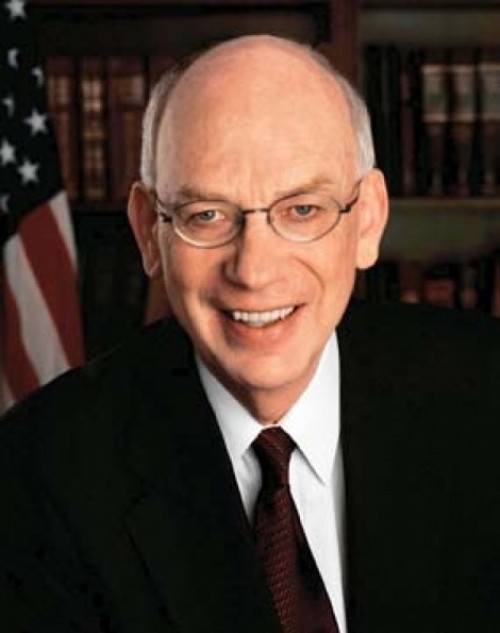In addition to creating new wilderness areas, Bennett’s Washington County Growth & Conservation Act proposed selling off federal property around St. George to give the community room to grow. Both Utah environmentalists and Washington County commissioners believe November’s election might, for the foreseeable future, close the door on such wilderness-for-development legislation. Environmentalists are breathing a little easier. St George-area commissioners are nervous.
The mood in Washington, D.C., and Utah has changed, says Scott Groene, executive director of the Southern Utah Wilderness Alliance. SUWA was one of several environmental organizations that negotiated with Bennett over his proposal—sell some federal land around St. George in exchange for creating additional wilderness—but ultimately couldn’t support the plan.
Groene notes the Bennett bill helped spark the creation of Vision Dixie, a grass-roots planning effort spearheaded by St. George residents who oppose building a proposed pipeline from Lake Powell to St. George. “People were surprised by how much of a voice there was for conservation and protecting federal lands,” in the region, Groene says. In the end, Vision Dixie “demonstrated there wasn’t support for [Bennett’s] vision.”
But it wasn’t local opposition that appears to have killed the bill, he says. Rather, members of the U.S. House and Senate have turned against the idea of selling federal lands.
As Congress came to a close for election season, Bennett was working with Democratic Senate Majority Leader Harry Reid, author of his own land privatization bill for his home state of Nevada. Bennett patterned his measure after Reid’s and planned to attach it to one of the must-pass bills of the session—either a budget bill or the Wall Street bailout package. The effort stalled after objections from Sen. Jeff Bingaman, D-New Mexico, chairman of the Energy & Natural Resources Committee. Bingaman wrote Reid on Sept. 22, “it would be manifestly unfair” to pass the Washington County bill when more than 100 wilderness bills assembled in his committee weren’t going to get a vote.
Bennett’s bill got a hearing at Bingaman’s committee but went no further. It wasn’t included in an omnibus wilderness package that would have protected lands in Virginia, Oregon, Idaho and Colorado without also selling public lands.
As first introduced in 2006, the Washington County lands bill would have authorized the Bureau of Land Management to sell more than 20,000 acres of federal land around St. George for potential development and created a right of way for the Lake Powell Pipeline.
Bennett retooled the bill dramatically in negotiations with conservation groups this year. Just 9,000 acres would be authorized for sale and the bill would create significantly more wilderness, including Utah’s first federally designated “wild and scenic” river. The bill proposed putting 80,000 acres off limits to off-road vehicles and created off-road restrictions for all of Washington County, including money for enforcement.
There was much to like in the plan, Groene admits. But ultimately his group couldn’t get past the bill’s selling off public lands and giving a portion of the proceeds to the county. “The legislation allowed the sale of federal land belonging to all,” he says.
The ultimate problem for Citizens for Dixie’s Future—the anti-pipeline group—was how the money from the sale of federal land would be spent. Paul Van Dam, the Citizens’ executive director, says he is convinced Washington County would have spent its share on the Lake Powell pipeline.
Fundamentally, Bennett’s bill clashed with the controlled-growth vision for Washington County laid out after Vision Dixie’s 18 months of public meetings. Selling off federal land would have put St. George on the path of communities like Phoenix—a victim of continuing sprawl, Van Dam says. “If we go with what seems to be the general drift and let developers push the process, that’s what you get.”
As the fates turned against the bill passing before congressional adjournment, Washington County Commissioner Jim Eardley worried about whether it could resurface after Election Day. If the Democrats post a big win, he says, “it could be lights out and the party’s over.”
More by Ted McDonough
-
Chaffetz's Constitution, Health Care Reform, Utah's Economy & Claire Geddes' Return
Congressman Jason Chaffetz, R-Utah, is cosponsoring legislation that would deny citizenship to children born in the United States to noncitizen parents, reversing long-standing law that everyone born in America is a citizen.
- Jul 15, 2009
-
Stimulated
If you don´t like the federal stimulus yet, wait a few months.
- Jul 15, 2009
-
Skinny Utahns, Camp Williams' Data Center & BCS Busters
Utahns are the eighth skinniest people in the country, according to new statistics from the Robert Wood Johnson Foundation.
- Jul 8, 2009
- More »
Latest in News
Readers also liked…
-
Raise a glass for E.L.T Harrison, architect of the Beerhive building on Main
Small Lake City
- Oct 11, 2023




